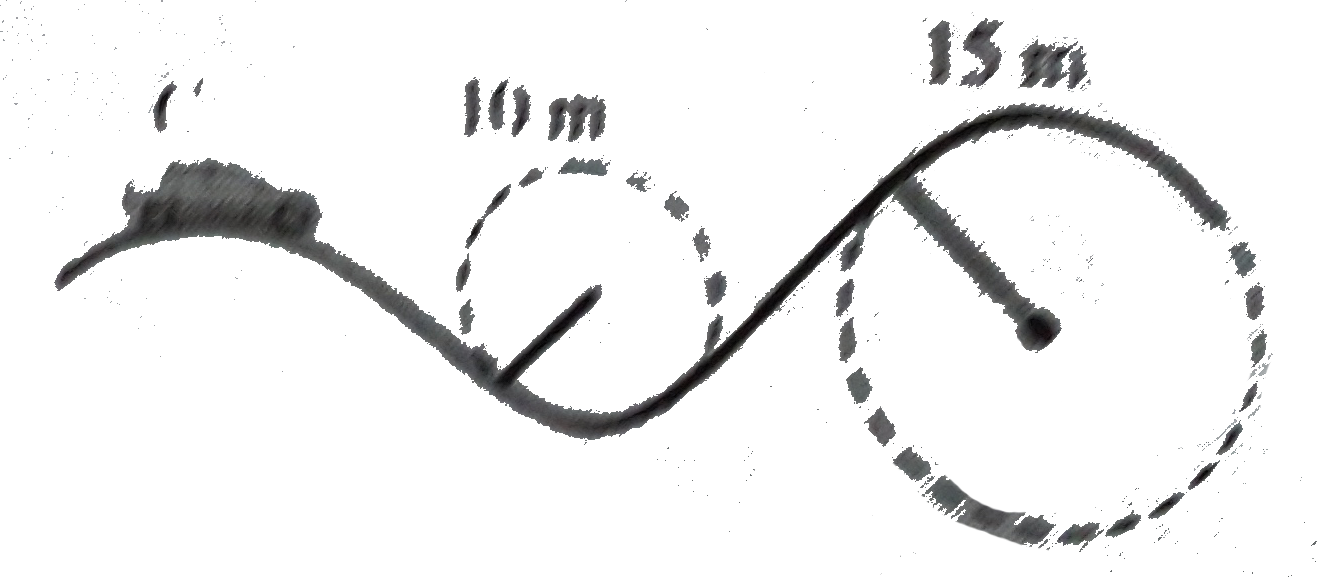An engine can pull four coaches at a maximum speed of 20ms−1. The mass of the engine is twice the mass of every coach. Assuming resistive forces to be proportional to the weight, approximate maximum speeds of the engine, when it pulls 12 and 6 coaches, are
8.5 m/s and 15 m/s respectively
6.5 m/s and 8 m/s respectively
8.5 m/s and 13 m/s respectively
10.5 m/s and 15 m/s respectively
The correct Answer is:A
When 4 coaches (m each) are attached with engine (2m) according to question P=K6mgv
(constant power),(Kbeing proportionality constant) Since resistive force is proportional to weight
Now is 12 coaches are attached
P=K14mgv1
So by equation (1) and (2)
6mgv=14mgv1
v1=614×V
⇒=614×20=6×107=607
=v1=8.5msec
Similarly for 6 coaches
⇒K6mgv=K8mgv2
⇒v2=68×20=34×20=15msec
Similar Questions
A car can pull a trailer of twice its mass up a certain slope at a maximum speed V. Without the trailer the maximum speed of the car, up the same slope is 2 V. The resistance to the motion is proportional to mass and square of speed. If the car (without trailer) starts to move down the same slope, with its engine shut off, prove that eventually it will acquire a constant speed. Find this speed.
View SolutionA car can pull a trailer of twice its mass up a certain slope at a maximum speed v=1m/s. Without the trailer the maximum speed of the car up the same slope is 2v. The resistance to the motion is proportinal to mass and square of speed. If the car (without trailer) starts to move down the same slope, with its engine shut off, eventually it will acquire a constant speed vt, then find v2t (in m2/s2)
View Solution
Knowledge Check
An engine can pull four coaches at a maximum speed of 20ms−1. The mass of the engine is twice the mass of every coach. Assuming resistive forces to be proportional to the weight, approximate maximum speeds of the engine, when it pulls 12 and 6 coaches, are
A8.5ms−1and15ms−1 respectivelyB6.5ms−1and8ms−1 respectivelyC8.5ms−1and13ms−1 respectivelyD10.5ms−1and15ms−1 respectivelyAn engine can move at the speed of 20/3 m/s without any wagon attached and reduction in the speed of the train is directly proportional to the square root of the number of wagons attached to the engine. When there are 9 wagons attached its speed is 5 m/s. The greatest number of wagons with which the engine can move is :
A144B12C143D24An engine can move at the speed of 20/3 m/s without any wagon attached. Reduction in the speed of the train is directly proportional to the square root of the no. of wagons attached . When there are only 4 engines attached its speed is (50/9) m/s. The greatest no. of wagons with which the engine can move is :
A144B143C12DNone of these
A car of mass 900 kg accelerates uniformly from rest to a speed of 60 km/h in a time of 2 s when traveling on a level road. If there is a constant resistance to motion of 20 N. Find the maximum power ( in kW) of the engine.
View SolutionA train has a constant speed of 40 ms−1 on a level road against resistive force of magnitude 3×104N. Find the power of the engine.
View SolutionA roller -coaster car a mass of 500kg when fully loaded with passengers

a. If the vehicle has a speed of 20.0ms−1 at point what is the force exerted by the track on the car at this point ?
b. What is the maximum speed the vehicle can have point B and still remain on the track?
View SolutionAssume the aerodynamic drag force on a car is proportional to its speed. If the power output from the engine is doubled, then the maximum speed of the car
View SolutionAn engine is pulling a train of mass m on a level track at a uniform speed u. The resistive froce offered per unit mass is f.
View Solution